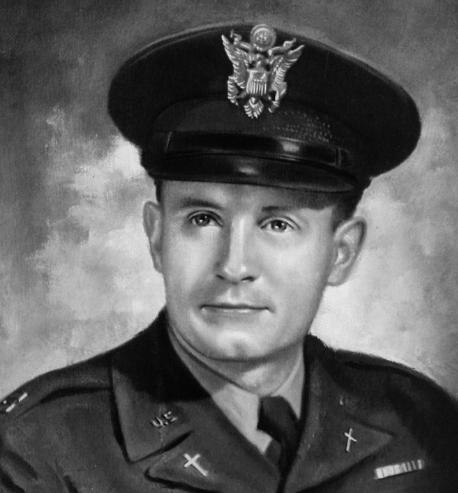
BY: TIM CARPENTER. Kansas Reflector
TOPEKA — Raymond Kapaun never met the uncle who served as a U.S. Army chaplain and died of malnutrition and pneumonia at a prison camp during the Korean War.
This nephew, born in 1957 and now a resident of Coupeville, Washington, became the beneficiary of family stories and military documentation attesting to the heroism, compassion and selflessness of Father Kapaun, who perished in 1951.
“I never personally met my uncle,” Raymon Kapaun told the Senate Federal and State Affairs Committee. “Father Emil was a priest, a soldier, a chaplain, a hero, but more than anything else he was a Kansas native through and through.”
On Wednesday, the Kansas Senate agreed. Senators voted 40-0 for Senate Bill 431, which would require the Capitol Preservation Committee to develop plans for a permanent memorial honoring the life of Emil Kapaun. The legislation sent to the Kansas House would set up the framework for the state to accept grants, gifts, contributions or bequests to finance creation and construction of a memorial inside the Capitol.
Michael Kelly, a 34-year veteran of the U.S. Air Force and a member of the Kansas council of the Military Officers Association of America, said Kapaun deserved to be further recognized for his physical and moral courage.
“His unrelenting courage and miraculous displays of selflessness under the most extreme conditions in the face of a hostile enemy force are shining beacons of positive character values that must never be lost to history,” Kelly said. “Chaplain Kapaun kept the faith and led many other soldiers to survive their ordeal as prisoners of war.”
Kapaun was born in 1916 on a farm near Pilsen, a community in Marion County. In 1940, he was ordained a Catholic priest in Wichita. He graduated from the U.S. Army chaplain school in 1944 and was assigned to Camp Wheeler in Georgia. He was posted after World War II to India and promoted to captain before released from active duty. In 1948, he returned to the Army and was assigned to the 8th Cavalry Regiment of the 1st Cavalry Division in Japan.
He deployed to South Korea less than one month after North Korea invaded South Korea. He earned a Bronze Star Medal for helping save the life of a wounded soldier pinned down by enemy fire. As the U.S. Army pushed north, he earned a reputation for ministering with an improvised alter on the hood of a Jeep. Intervention by Chinese troops on North Korea’s behalf forced a U.S. retreat, but Kapaun stayed with 800 men of the 3rd Battalion ordered to slow the Chinese onslaught.
Kapaun braved enemy fire to rescue nearly 40 men, for which President Barack Obama posthumously awarded Kapaun the Medal of Honor in 2013. Kapaun was taken prison and marched to a camp in North Korea. He stole food for starving soldiers and smuggled dysentery drugs to fellow prisoners.
He led a final Easter service on March 25, 1951, before prison guards moved him to a building where he died May 23, 1951. His remains were eventually returned to the United States and buried in Hawaii. His remains were disinterred and positively identified in 2021. He was reburied in Park City, near Wichita.
U.S. Sen. Jerry Moran, a Kansas Republican, advocated for a change in federal law to require the U.S. Department of Defense and Obama to consider awarding Kapaun the Medal of Honor. Moran also worked to get Kapaun’s remains identified and returned to Kansas.
“By erecting a statue of Father Kapaun within the Kansas state Capitol, we not only pay tribute to a local hero but also celebrate the values that define our state and our nation,” Moran said. “His story is a powerful example of how one individual’s actions can make a profound difference.”





